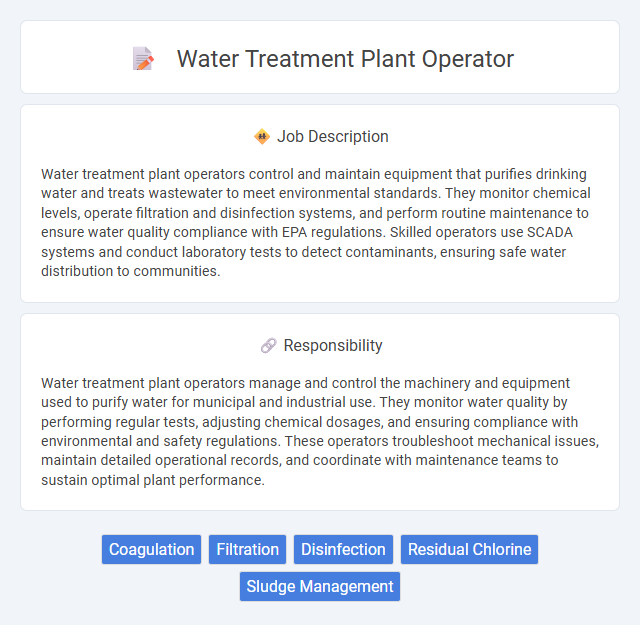
Water treatment plant operators control and maintain equipment that purifies drinking water and treats wastewater to meet environmental standards. They monitor chemical levels, operate filtration and disinfection systems, and perform routine maintenance to ensure water quality compliance with EPA regulations. Skilled operators use SCADA systems and conduct laboratory tests to detect contaminants, ensuring safe water distribution to communities.
Individuals who are physically fit and able to work in variable weather conditions may likely be suitable for a water treatment plant operator role. Those with strong analytical skills and attention to detail probably find the job manageable, as it requires monitoring equipment and maintaining water quality standards. People who prefer routine tasks and can handle occasional emergency situations are also expected to perform well in this position.
Qualification
Water treatment plant operators typically require a high school diploma or equivalent, with many employers preferring candidates who hold an associate degree in environmental science, chemistry, or a related field. Certification from a state or national agency, such as the Grade I or II Water Treatment Operator license, is often mandatory to ensure compliance with safety and operational standards. Hands-on experience with water quality testing, treatment processes, and equipment maintenance is essential for effective job performance.
Responsibility
Water treatment plant operators manage and control the machinery and equipment used to purify water for municipal and industrial use. They monitor water quality by performing regular tests, adjusting chemical dosages, and ensuring compliance with environmental and safety regulations. These operators troubleshoot mechanical issues, maintain detailed operational records, and coordinate with maintenance teams to sustain optimal plant performance.
Benefit
Water treatment plant operators likely benefit from stable employment due to the essential nature of their work in public health and environmental protection. They probably enjoy steady income and opportunities for overtime, reflecting the 24/7 operational needs of water facilities. Access to comprehensive training and certifications may also enhance career advancement and job security within the industry.
Challenge
Water treatment plant operator roles likely involve consistently managing complex systems to ensure safe and clean water supply. The challenge probably lies in monitoring multiple parameters and responding swiftly to fluctuations in water quality, which demands strong analytical skills. Operators may also face pressure from regulatory compliance and emergency situations requiring quick, precise decision-making.
Career Advancement
Water treatment plant operators can advance their careers by gaining certifications such as Grade I or II Water Treatment Operator licenses, which improve job prospects and salary potential. Specializing in advanced water quality analysis or wastewater treatment technology often opens opportunities for supervisory or management roles within municipal or industrial plants. Continuous training in regulatory compliance and emerging environmental technologies is essential for career growth and leadership positions in the water treatment sector.
Key Terms
Coagulation
A water treatment plant operator monitors and controls the coagulation process to remove suspended solids and contaminants from raw water sources. They carefully adjust chemical dosages, such as alum or ferric chloride, to promote particle aggregation, enhancing sedimentation and filtration efficiency. Precise management of coagulation parameters is critical to ensuring safe, clean drinking water that meets regulatory standards.
Filtration
Water treatment plant operators specializing in filtration manage the process of removing impurities and contaminants from water using advanced filtration systems such as rapid sand filters, membrane filters, and activated carbon filters. They monitor filter performance, conduct routine maintenance, and ensure compliance with environmental regulations to maintain water quality standards. Proficiency in water chemistry, system diagnostics, and operational adjustments is essential for optimizing filtration efficiency and safeguarding public health.
Disinfection
Water treatment plant operators play a critical role in ensuring safe drinking water by managing disinfection processes such as chlorination, ultraviolet (UV) treatment, and ozonation to eliminate harmful pathogens. They monitor disinfectant levels, adjust chemical dosages, and conduct routine testing to maintain compliance with Environmental Protection Agency (EPA) standards and prevent microbial contamination. Effective disinfection control reduces waterborne diseases, protects public health, and supports regulatory requirements for water quality.
Residual Chlorine
Water treatment plant operators continually monitor residual chlorine levels to ensure safe and effective disinfection in potable water supply systems. Maintaining optimal residual chlorine concentration, typically between 0.2 to 0.5 mg/L, prevents microbial contamination and complies with regulatory standards such as those set by the EPA. Accurate measurement of residual chlorine using colorimetric or amperometric methods is critical to balancing public health protection with minimizing taste and odor issues in treated water.
Sludge Management
Water treatment plant operators specializing in sludge management monitor and control the processes involved in the thickening, dewatering, and disposal of sludge to ensure environmental compliance and operational efficiency. They operate equipment such as centrifuges, belt filter presses, and digesters to reduce sludge volume and manage byproducts safely. Precise sludge handling minimizes environmental impact and supports regulatory adherence, contributing to sustainable wastewater treatment operations.
 kuljobs.com
kuljobs.com